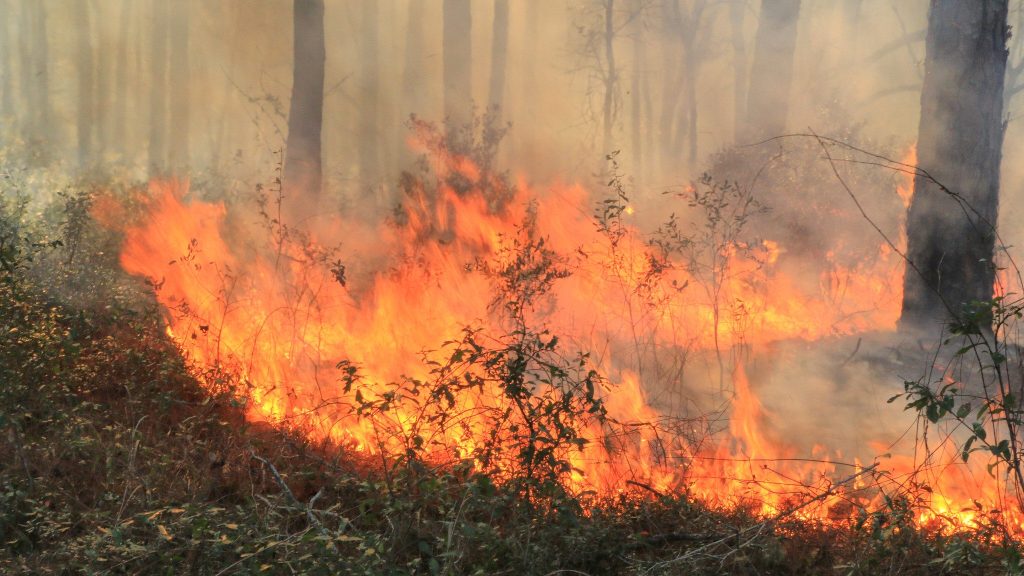Future of Fire: Development of an Early Warning System to Identify Changing Prescribed Burn Opportunities Across Southeast US Fire-Adapted Habitats

Project Information
Principal Investigator: Jaime Collazo, North Carolina State University
Cooperators: Adam Terando (Southeast Climate Adaptation Science Center), J. Kevin Hiers (Tall Timbers Research Station), John Kupfer (University of South Carolina), Brian Reich (North Carolina State University)
Overview
Frequent, low-intensity wildfires were once widespread across the Southeast US, which led to a reduction in unchecked vegetation growth that provided fuel for high-intensity fires. Both intentional and unintentional fire suppression and land-use changes have reduced many of these wildfires and the fire-adapted habitats in the region over time. This loss of frequent low-intensity wildfires on the landscape also increases the severity of wildfires due to fuel buildup and the encroachment of woody species. The remaining habitats and their native species (many of which are of conservation concern) are now almost completely dependent on prescribed burns for their persistence and survival. Successful application of fire in this region requires careful planning and assessment of the risks and trade-offs involved when deciding whether or not to conduct a controlled burn.
Many of these risks are closely tied to environmental conditions and are reflected in sets of ‘prescription’ parameters that define operating conditions where the risk level is considered acceptable. Recent research funded by the Southeast CASC suggests that climate change could reduce opportunities for prescribed burning. This could lead to a delay in prescribed fire plans or managers being forced to reconsider their evaluation of risks and tradeoffs of prescribed burning. To aid decision-makers in meeting their objectives of fire-risk reduction and habitat improvement, this project proposes the development of a prototype model. This model will characterize short-term and long-term risks induced by climate change for Prescribed Fire Managers (PRMs) in the Southeast US. This project’s state-of-the-science methods involve three objectives: characterize the ‘fail-states’ where managers should avoid the use of prescribed fire, characterize the risk of experiencing these ‘fail-states’, and characterize extreme wildfire risk based on long-term climate model projections. When combined with updated model projections of extreme wildfires, this research will provide the most comprehensive assessment of climate-related fire risk for the region. This project is a sub-project of an integrated National CASC synthesis project.
Relevant Web Posts
National CASC Project:
Future of Fire: Towards a National Synthesis of Wildland Fire Under a Changing Climate
Principal Investigator(s): Jennifer Balch (University of Colorado Boulder), Christian Giardina (USDA-Forest Service), Scott Rupp (University of Alaska Fairbanks), Jeremy Littell (Climate Adaptation Science Centers), Omkar Joshi (Oklahoma State University), Soloman Dobrowski (University of Montana), Beth Rose Middleton (University of California, Davis), Hugh Stafford (USDA-Forest Service), Adam Terando (Southeast Climate Adaptation Science Center), Jaime Collazo (North Carolina State University)
Proposed Project Completion: May 2023
Implements Science Plan Theme: Adaptation
Overview
Abundant scientific research has characterized the relationships between climate and fire in ecosystems of the United States, and there is substantial evidence that the role of fire in ecosystems is likely to change with a changing climate. Changing fire patterns pose numerous natural resource management challenges and decision makers in natural-resource management increasingly require information about potential future changes in fire regimes to effectively prepare for and adapt to climate change impacts. An effective forward-looking fire science synthesis is urgently required to reflect the changing dimensions of human fire management, recognizing that fire causes, effects, impacts, and management are all interrelated components of a social-ecological-hydrological system with the potential for profound ecological transformation.
To meet this need, the project team will conduct a synthesis of changing fire dynamics across the United States and will relate these changes to natural resource management. Through this project, post-doctoral fellows will be engaged to lead this research and will conduct an assessment of: 1) the state of the science on how climate change is currently affecting and projected to transform fire processes; 2) how projected changes fit within the context of national patterns and trends; 3) the implications of these changes for natural resource management and climate change adaptation efforts. Products will include one or more peer reviewed manuscript(s) on the regional findings; one or more peer reviewed manuscripts placing these regional findings in a broader national context; and public facing documents and/or communication activities (e.g., webinars) to engage managers with the results of this work. (Note: this project is jointly supported by the National, AK, NC, NW, PI, SC, SE and SW CASC)
